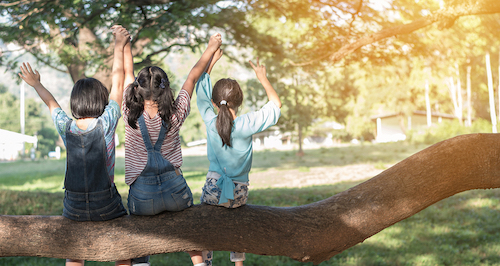
![]()
Imagine this: You’re five years old and you've just been given your favorite treat. Maybe it's a marshmallow or maybe it’s a lollipop. Whatever it is, you want to devour it instantly but are told that if you wait a certain amount of time and don’t eat it until that certain amount of time is up, you’ll get another treat of the same variety, thereby increasing your tally to two treats. What would you do? What would you say a five-year-old would do?
A new study published in the Journal of Psychological Science looked at five and six-year-old children's willingness to delay gratification for cooperative as opposed to individualistic goals and whether this differed in children from two highly diverse cultures from Germany and Kenya.
“We tested two conflicting hypotheses,” study author Rebecca Koomen told us. “On the one hand, we reasoned that cooperative contexts in which individuals mutually rely on one another and jointly benefit from their pursuits might elicit cooperative motivations and facilitate children's willingness to invest effort/delay gratification. We called this the interdependence hypothesis.”
“On the other hand,” fellow study author Sebastian Grueneisen told us, “relying on others often bears risks and, in the current setup, actually decreased the likelihood of benefiting from one's own investment. If children are mainly preoccupied with maximizing the material returns of their investment by weighing the cost of waiting against the benefit of receiving a second treat, we would expect them to be less willing to delay gratification if they rely on a partner. We called this the rational choice hypothesis (note that this rational choice hypothesis is only concerned with material benefits, not with social ones).”
What sparked this research explained the authors, was the realization that, in order to cooperate with others, we often have to delay gratification by investing effort into joint long-term goals while resisting short-term temptations. For example, for a successful potluck dinner, we have to resist eating the desert we just made while trusting our friends to equally have their urges under control, so that we can all meet later and eat the fruits of our labour together. Similarly, we might have to contribute to a joint work report while resisting the temptation to watch videos on the Internet instead.
“We noticed that,” Koomen told us, “while being one of the most widely researched topics in developmental psychology, children’s abilities to delay gratification have scarcely been studied in cooperative contexts.”
To test their theory, the researchers designed a cooperative version of the famous “marshmallow test”. In the standard marshmallow test, children are given a treat, typically a marshmallow and are told that they can either eat it right away or wait until an experimenter returns at a later date. If they manage to wait, they get a second treat.
“We compared children's behavior in this standard version of the marshmallow test with a cooperative version in which two children relied on one another to succeed,” Grueneisen told us. “Only if both of them waited did both get a second treat (children were placed into different rooms and could not communicate or see each other during the task).”
Moreover, the vast majority of developmental work has exclusively studied children from Western cultures which limits the extent to which findings can be generalized. The researchers therefore compared the behavior of German and Kenyan children.
“We found that children from both cultures were more likely to delay gratification in the new cooperative version than in the standard marshmallow test,” Koomen told us. “This was the case even though cooperation was risky and therefore less likely to result in a reward, showing that children’s behavior was unlikely to be driven by material goals alone. These findings support our interdependence hypothesis while refuting the rational choice hypothesis and indicate that, for young children, cooperative activities can be more motivating than individual ones, maybe because others relying on them elicits feelings of responsibility or a sense of obligation towards their social partners."
The study also found that, overall, Kenyan children were a little better at delaying gratification than German children. Both Kooperman and Grueneisen were surprised with the results.
“What is striking about these findings is that children were more willing to delay gratification in the cooperative than in the individual version of the task even though cooperation was risky,” Grueneisen told us. Children had to trust that their partner would delay gratification too and therefore, from a material perspective, waiting was less likely to result in a reward. We were also surprised by how similarly German and Kenyan children responded to the cooperative version of the task. The fact that we obtained these findings even though children could not see or communicate with each other attests to the strong motivational consequences that simply being in a cooperative context has for children from early on in development.”
The researchers believe that the findings indicate that, from early on in development, children’s motivation to invest effort can be elicited particularly by cooperative goals in which they mutually rely on one another with their peers. This is interesting for scientists from various disciplines studying the origins of human sociality but might also be relevant for practitioners.
Patricia Tomasi is a mom, maternal mental health advocate, journalist, and speaker. She writes regularly for the Huffington Post Canada, focusing primarily on maternal mental health after suffering from severe postpartum anxiety twice. You can find her Huffington Post biography here. Patricia is also a Patient Expert Advisor for the North American-based, Maternal Mental Health Research Collective and is the founder of the online peer support group - Facebook Postpartum Depression & Anxiety Support Group - with over 1500 members worldwide. Blog: www.patriciatomasiblog.wordpress.com
Email: tomasi.patricia@gmail.com